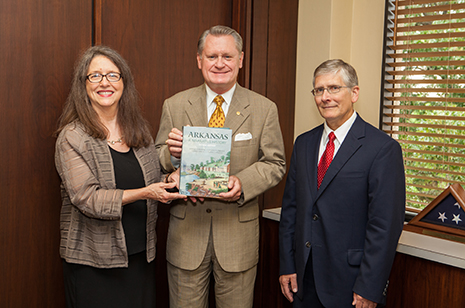FAYETTEVILLE, Ark. – George Sabo, University of Arkansas professor and director of the Arkansas Archaeological Survey, and U of A history professor Jeannie Whayne recently presented a copy of the latest edition of the textbook Arkansas: A Narrative History to Chancellor G. David Gearhart and will be signing copies in Little Rock near the end of September.
The book is a comprehensive state history that has been invaluable to students and the general public since its original publication over 10 years ago. The original edition won the Arkansiana Award when it was published in 2002, and the book is widely used in colleges throughout the state.
The new edition has been updated and expanded with three additional chapters, including a new chapter on Arkansas geography. It also covers fresh material on the civil rights movement in the state and the struggle over integration, a new analysis of Arkansas’ school-funding issues and an examination of the Natural State’s transition from colonialism to its entry into the global political economy. Maps are also dramatically enhanced.
The University of Arkansas Press published both editions of the award-winning textbook.
Sabo is a professor of anthropology and environmental dynamics. Whayne is a professor in the history department. The two other authors of the book also have University of Arkansas connections: Thomas A. DeBlack received his doctoral degree in 1995 under the direction of the late Willard B. Gatewood, distinguished professor of history. Morris S. Arnold received his bachelor’s degree in electrical engineering (1965) and his bachelor of laws degree (1968) from the U of A.
Retained from the original edition are Sabo’s exploration of Native American prehistory and the cataclysmic shocks of climate change and European arrival. He discusses how surviving native groups maintained traditional economic and social institutions, which in turn proved crucial to early colonists.
 |
Arnold details how colonists and Indians withstood international conflict through intermarriage, diplomacy, political alliances and trade. Whayne demonstrates that these multicultural relationships also characterized early American settlement but that the balance of power shifted dramatically when white settlers brought in plantation agriculture and slavery.
DeBlack shows how the prosperity of the plantation society also brought the state into the Civil War. He describes the impact of war on different regions of the state, as well as banking fiascoes, the state’s reputation for violence and the mixed blessing of statehood.
Whayne’s later chapters track the linked histories of progressivism, civil rights, education and industrialization. She explores how the political process was shaped by who could and could not participate, focusing especially on women’s organizations for suffrage, temperance, education and, later, civil rights.
Arnold is about to retire from his position of judge on the 8th U.S. Circuit Court of Appeals. He wrote Rumble of a Distant Drum: The Quapaws and the Old World Newcomers, 1673–1804, winner of the John G. Ragsdale Award and the Booker Worthen Literary Prize.
DeBlack is professor of history at Arkansas Tech University. He is the author of With Fire and Sword: Arkansas, 1861–1874, winner of the Butler-Remmel Arkansas History Literary Prize.
Sabo’s publications include Rock Art in Arkansas and Paths of Our Children: Historic Indians of Arkansas. He was recently appointed director of the Arkansas Archeological Survey, housed on the U of A campus.
Whayne is author of A New Plantation South: Land, Labor, Federal Favor in Twentieth-Century Arkansas, winner of the Virginia Ledbetter Book Award, and Delta Empire: Lee Wilson and the Transformation of Agriculture in the New South, winner of the John G. Ragsdale Award in Arkansas History. She serves as co-director of the Wally Cordes Teaching and Faculty Support Center at the University of Arkansas.
Whayne, DeBlack, and Sabo will be discussing and signing Arkansas: A Narrative History from 6-8 p.m. on Sept. 24 at the Old State House Museum in Little Rock. The event is free and open to the public.
Topics
Contacts
Melissa King, director of sales and marketing
University of Arkansas Press
479-575-7715,
